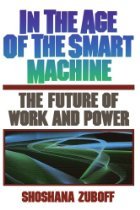In the Age of the Smart MachineThe Future of Work and Power
|

|
 Diese Seite wurde seit 1 Jahr inhaltlich nicht mehr aktualisiert.
Unter Umständen ist sie nicht mehr aktuell.
Diese Seite wurde seit 1 Jahr inhaltlich nicht mehr aktualisiert.
Unter Umständen ist sie nicht mehr aktuell.
 Zusammenfassungen
Zusammenfassungen
 Computer-based technologies
are not neutral; they embody essential characteristics that are
bound to alter the nature of work within our factories and offices, and
among workers, professionals, and managers. New choices are laid open
by these technologies, and these choices are being confronted in the
daily lives of men and women across the Iandscape of modern organizations.
This book is an effort to understand the deep structure of these
choices-the historical, psychological, and organizational forces that
imbue our conduct and sensibility. It is also a vision of a fruitful future,
a call for action that can Iead us beyond the stale reproduction of the
past into an era that offers a historic opportunity to more ful ly develop
the economic and human potential of our work organizations.
Computer-based technologies
are not neutral; they embody essential characteristics that are
bound to alter the nature of work within our factories and offices, and
among workers, professionals, and managers. New choices are laid open
by these technologies, and these choices are being confronted in the
daily lives of men and women across the Iandscape of modern organizations.
This book is an effort to understand the deep structure of these
choices-the historical, psychological, and organizational forces that
imbue our conduct and sensibility. It is also a vision of a fruitful future,
a call for action that can Iead us beyond the stale reproduction of the
past into an era that offers a historic opportunity to more ful ly develop
the economic and human potential of our work organizations. Kapitel
Kapitel 
 Dieses Buch erwähnt ...
Dieses Buch erwähnt ...
 Aussagen KB IB clear | ICT beeinflusst Gesellschaft |
 Begriffe KB IB clear | Arbeitwork
,  Automatisierung
, Automatisierung
,  Computer Computer computer
, computer
,  Technologie Technologie technology technology
|
 Zitationsgraph
Zitationsgraph
 Zitationsgraph (Beta-Test mit vis.js)
Zitationsgraph (Beta-Test mit vis.js)
 Zeitleiste
Zeitleiste
 20 Erwähnungen
20 Erwähnungen 
- Images of Organization (Gareth Morgan) (1986)

- Sichtweisen der Informatik (Wolfgang Coy, Frieder Nake, Jörg-Martin Pflüger, Arno Rolf, Jürgen Seetzen, Dirk Siefkes, Reinhard Stransfeld) (1992)


- Theories of the Information Society - 4th Edition (Frank Webster) (1995)

- Der Aufstieg der Netzwerkgesellschaft (Manuel Castells) (1996)

- Mind Maps und Concept Maps - Visualisieren, Organisieren, Kommunizieren (Matthias Nückles, Johannes Gurlitt, Tobias Pabst, Alexander Renkl) (2004)

- Education in Cyberspace (Siân Bayne, Ray Land) (2004)

- 11. Screen or Monitor? - Surveillance and disciplinary power in online learning environments (Ray Land, Siân Bayne) (2002)


- 11. Screen or Monitor? - Surveillance and disciplinary power in online learning environments (Ray Land, Siân Bayne) (2002)
- Persönliche Weblogs in Organisationen - Spielzeug oder Werkzeug für ein zeitgemäßes Wissensmanagement? (Karsten Ehms) (2007)


- Learning with Laptops - A Multi-Method Case Study (Douglas Grimes, Mark Warschauer) (2009)

- Rethinking Education in the Age of Technology - The Digital Revolution and Schooling in America (Allan Collins, Richard Halverson) (2009)

- Bankrott der Bildungsgesellschaft - Pädagogik in politökonomischen Kontexten (Iwan Pasuchin) (2012)


- «Man muss das System umbauen» (Shoshana Zuboff, Alexandra Kedves) (2013)

- Informatik ist auch eine Sozialwissenschaft! (Abraham Bernstein) (2013)


- Distrusting Educational Technology - Critical Questions for Changing Times (Neil Selwyn) (2013)

- Technologischer Totalitarismus - Eine Debatte (Frank Schirrmacher) (2015)

- The Future of the Professions - How Technology Will Transform the Work of Human Experts (Richard Susskind, Daniel Susskind) (2016)

- Stellungnahme Bündnis für humane Bildung - zu den Anträgen im Kultusausschuss des Niedersächsischen Landtages im Vorfeld der Anhörung der öffentlichen Sitzung des Kultusausschusses des Niedersächsischen Landtages am 24. Mai 2019 (Peter Hensinger, Ralf Lankau, Ingo Leipner) (2019)


- Digitalisierung aus pädagogische Perspektive (2021)
- Pädagogik 12/2021 (2021)

- Was Hänschen nicht lernt... - Kritische Statements zur Digitalisierung in der Grundschule (Ralf Lankau) (2022)


- Power and Progress - Our Thousand-Year Struggle Over Technology and Prosperity (Daron Acemoglu, Simon Johnson) (2023)

 Co-zitierte Bücher
Co-zitierte Bücher


(George Orwell) (1948)

Bowling alone
(Robert Putnam) (2000)

Das Kapital
(Karl Marx)

The Lexus and the Olive Tree
(Thomas Friedman) Bei amazon.de als englische Paperback-Ausgabe anschauen
Bei amazon.de als englische Paperback-Ausgabe anschauen
How blogs, MySpace, YouTube, and the rest of today's user-generated media are destroying our economy, our culture, and our values
(Andrew Keen) (2008)

The Race between Education and Technology
(Claudia Goldin) (2008)
Skills, Tasks and Technologies
Implications for Employment and Earnings
(Daron Acemoglu, David Autor) (2010)

 Volltext dieses Dokuments
Volltext dieses Dokuments
 | Dillemas of Transformation in the Age of the Smart Machine: Artikel als Volltext ( : :  , 477 kByte) , 477 kByte) |
 | In the Age of the Smart Machine: Gesamtes Buch als Volltext ( : :  , 3320 kByte) , 3320 kByte) |
 Bibliographisches
Bibliographisches 
 Beat und dieses Buch
Beat und dieses Buch
Beat hat dieses Buch während seiner Zeit am Institut für Medien und Schule (IMS) ins Biblionetz aufgenommen. Beat besitzt kein physisches, aber ein digitales Exemplar. (das er aber aus Urheberrechtsgründen nicht einfach weitergeben darf). Aufgrund der wenigen Einträge im Biblionetz scheint er es nicht wirklich gelesen zu haben.































 Biblionetz-History
Biblionetz-History